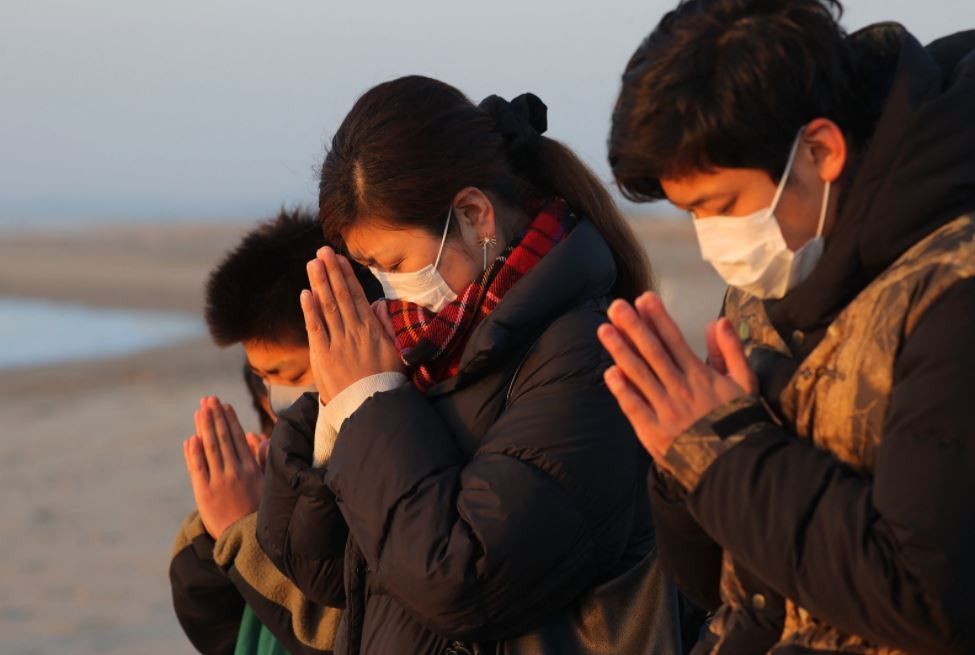Japan falls silent to mark decade since tsunami disaster

HISANOHAMA, Japan — Japan fell silent on Thursday to mark 10 years since the worst natural disaster in the country's living memory: a powerful earthquake, deadly tsunami and nuclear meltdown that traumatized a nation.
A minute's silence was observed across the country at 2.46 pm local time (0546 GMT), the precise moment a 9.0 magnitude quake hit off the northeast coast on March 11, 2011.
Around 18,500 people were killed or left missing in the disaster, most of them claimed by the towering waves triggered by one of the strongest quakes ever recorded.
The ensuing nuclear meltdown at the Fukushima Daiichi nuclear plant blanketed nearby areas with radiation, rendering some towns uninhabitable for years and displacing tens of thousands of residents.
Speaking at a ceremony in Tokyo's national theatre, Emperor Naruhito said the "unforgettable memory of the tragedy" persisted a decade on.
"Many of those afflicted, in spite of their having suffered from unimaginably enormous damage, have overcome numerous hardships by helping one another," he added.
The annual memorial event was held before a smaller audience than usual, with the capital and nearby areas currently under a virus state of emergency.
Prime Minister Yoshihide Suga said the challenges faced by survivors had been compounded by the pandemic and natural disasters, including a recent strong quake in the region, classified as an aftershock of the 2011 tremor.
But he said Japan had always "overcome every crisis with courage and hope".
Private and public commemorations were seen across Japan as bereaved local residents laid flowers at graves and placed letters to missing family members into the sea.
In Fukushima prefecture's Hisanohama, a group of locals gathered by the shore, where a line of Buddhist monks marched past beating drums and chanting prayers.
A siren marked the start of the minute's silence.
"I don't know why, but I felt a lot more emotional this morning than I was at each of the past anniversaries," 86-year-old Tomoi Ogi told AFP.
"I woke up and watched TV, and then I was thinking to myself: 'Oh, it has been really 10 years.' It feels long, but it also feels short."
Earlier in the day, 78-year-old Toshio Kumaki walked along a giant sea wall built after the tsunami and offered a prayer.
Around 60 people were killed in Ohisa, one of the districts adjacent to the beach, when tsunami waves of seven metres washed ashore, wiping away everything but a tiny shrine.
Kumaki's eyes filled with tears as he remembered the disaster. "It was really scary."
Tributes and condolences poured in from around the world, with everyone from UN Secretary Antonio Guterres to singer Lady Gaga offering their thoughts on the anniversary.
'People died before my eyes'
Searches for those still missing are taking place this week, as loved ones refuse to relinquish hope of finding them even a decade on.
The chances of success may appear slim, but just last week the remains of a woman missing since the tsunami were identified, in what her surviving son described as a chance to process his emotions and move forward.
The disaster is being marked just two weeks before the Olympic torch relay kicks off in Fukushima prefecture, nodding to efforts to cast the event as the 'Reconstruction Games'.
The pandemic has cast a long shadow over the Olympics, forcing their unprecedented year-long postponement, but the government and organisers are hoping the relay will bring the spotlight back to the region.
A decade on, the disaster has shaped Japan's preparations for natural disasters, with many towns along the coast building new or higher sea walls.
Evacuation routes and plans have been refined and improved in a country that regularly deals with disasters ranging from typhoons to earthquakes.
Nayuta Ganbe in Miyagi's Sendai city speaks often at events about disaster prevention, sharing his experience of the tsunami, but he usually marks the anniversary privately.
"It's the day when I lost my classmates. People died before my eyes. March 11 is a day that I hoped would never come again," the 21-year-old told AFP recently.
But this year he decided to participate in an event on the anniversary, hoping it will help him with the ongoing work of processing his trauma.
For others, the anniversary will be a moment for quiet reflection on a tragedy that continues to reverberate.
Tens of thousands of people who evacuated fearing radiation are still displaced, and around two percent of Fukushima prefecture remains off-limits.
Most of Japan's nuclear reactors are still offline, and government plans to revitalise the sector are controversial.
Reverend Akira Sato, who ministered at several churches that in areas still largely off-limits around the Fukushima plant, is spending the day in reflection at one of the churches he had to abandon.
"Together with my wife, I will silently think back over the days of the disaster and offer a prayer." — with Shingo Ito in Tokyo
- Latest
- Trending




























